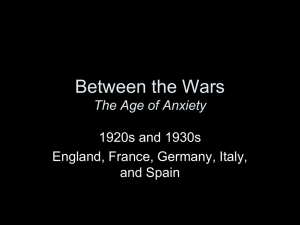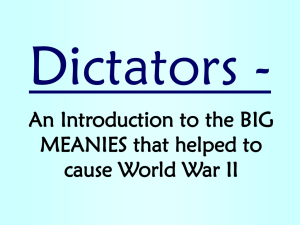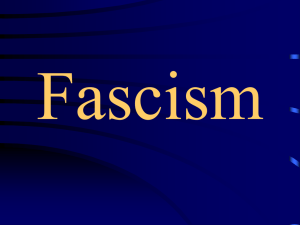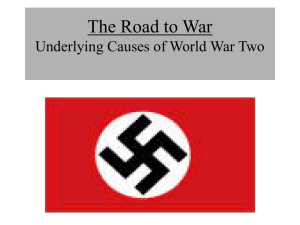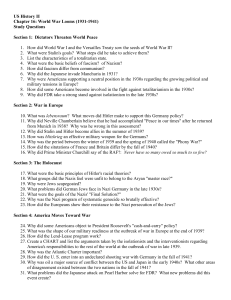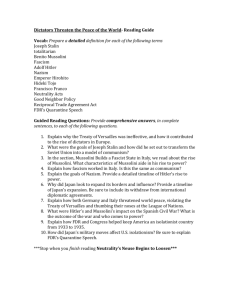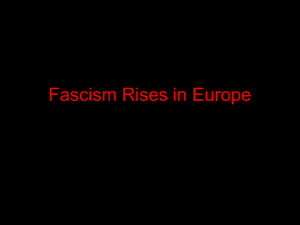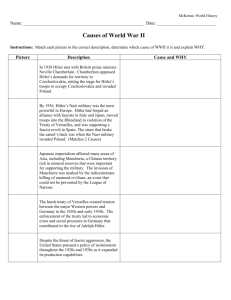Road to WWII
advertisement
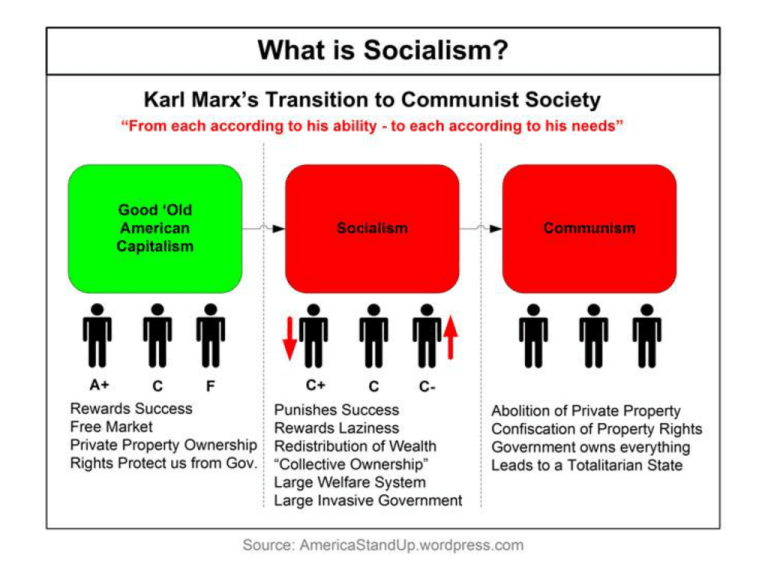
The Road to War Underlying Causes of World War Two 1. The Treaty of Versailles Harsh terms intended to make Germany powerless • accept total blame for WW1 • reduced military • reparations of $33 billion • loss of territory In reality the treaty had the opposite effect. It gave German’s grievances that Hitler would attempt to solve, such as restoring national pride 2. Emergence of New Countries After WW1 After World War One Many Germans felt German people were these countries should living in new “belong” to Germany countries such as Poland, Czechoslovakia, and Austria 3. Rise of Fascism • Facism: “A system of government in which nationalism is promoted, labour and industry are regulated by a strong national government, and all opposition is suppressed March on Rome • The political ideology of fascism originated with Benito Mussolini, who became dictator of Italy in 1922 • 1922- “March on Rome” - Mussolini’s blackshirts destroyed Italy’s government Benito Mussolini • called “Il Duce” meaning “the leader” • created a totalitarian dictatorship by banning opposing political parties, unions, censoring newspapers, creating secret police force Rise of Adolph Hitler • 1923: Hitler, leader of Nazi party, conducts an armed revolt in Munich - the “Beer Hall Putsch” • Hitler thrown in prison • wrote book “Mein Kampf” (my struggle) while in prison Rise of Fascism in Germany • 1933 -Hitler becomes leader “Fuhrer” • Hitler’s policy of “Lebensraum” - he wanted to take over German speaking countries such as Austria, Poland, Czechoslovakia Nazi Party Rules Germany • Hitler elected as Chancellor of Germany • Created a fascist state by using secret police to ban opposition Anti-Semitism in Germany • Blamed Germany’s problems on “scapegoats” such as Jews • Nazi party policy very racist and anti-Semitic • widespread discrimination against Jews in Germany Nazi’s burn Synagogue 4. Failure of the League of Nations League of Nations established to prevent war Problems: 1) Non-intervention is when one does not involve themselves with foreign affairs. 2) Appeasement is the act of giving into, or satisfying ones demands. • Canada and most other countries followed a policy of nonintervention and appeasement Spanish Civil War In 1936 a Spanish civil war breaks out between: New Republic government led by communists vs. Fascists led by Francisco Franco Response to Spanish Civil War • “MacKenzie-Papineau Battalion” made up of Canadian supporters of communism- over half of volunteers die • Britain, France and Canada maintain official policy of nonintervention The Manchurian Crisis • Sept. 1931: Japan invaded Chinese province of Manchuria on the pretext that China attacked Japanese-owned South Manchurian Railroad Manchurian Crisis (con’t) • China applied to the League of Nations for help • League condemned Japan’s actions, but there was little support for economic sanctions due to Great Depression Invasion of Abyssinia • Border clash between Abyssinian troops (Africa) and neighboring Italian Somaliland • Mussolini launched full-scale attack against Abyssinia • Italy(tanks, aircraft) vs. Abyssinia (spears) • League of Nations imposes boycott against Italy, but little world enthusiasm for sanctions 5. Formation of Axis Powers In 1937 Germany, Italy, and Japan made a pact not to go to war with each other. They became known as the “Axis Powers” during World War Two Hitler with Mussolini 6. Soviet-Nazi Non-Aggression Pact • August 1939: Stalin and Hitler agreed to divide Poland between them • March 1939: Germany took over Czechoslovakia German ambassador Von Ribbentrop laughs with Stalin as Molotov signs pact 7. World War Two Begins • Sept. 1, 1939: Germany invaded Poland • Britain and France declare war on Germany • Canada declared war on Germany on Sept. 10, 1939 German troops march into Poland
